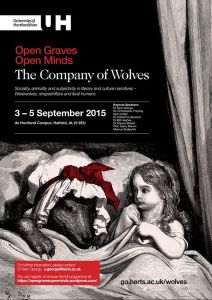Thank you once more for your contribution to the wonderful Company of Wolves Conference. There was a diverse range of papers, all fascinating, and this was one of the factors that made the conference work so well.
As promised, we are inviting you to recast your conference papers into essays. We will be publishing a ‘Company of Wolves’ edited book collection with Manchester University Press and a special issue of Gothic Studies.
First drafts (of 5000–7000 words, including endnotes but excluding works cited) should be submitted by 30 January 2016 as an email attachment in MS Word (12-point, Times New Roman, double-spaced) document format to both Dr Sam George, s.george@herts.ac.uk; and Dr Bill Hughes, bill.enlightenment@gmail.com.
Please use UK spelling and punctuation and conform to the MHRA format, with endnotes and short-title references and a separate works cited section. Please use your surname as the document title. The abstract should be sent in the following format: (1) Title (2) Presenter(s) (3) Institutional affiliation (4) Email address (5) Abstract (6) Article/chapter.
We hope to arrange the publications so that the interrelation of key themes among essays emerges, as it did so well at the conference. We therefore include the original blurb below to remind you of those themes.
Wolves have long been the archetypal enemy of human company, preying on the unguarded boundaries of civilisation, threatening the pastoral of ideal sociality and figuring as sexual predators. Yet, in their way, with their complex pack interactions, they have served as a model for society. Lately, this ancient enemy has been rehabilitated and reappraised, and rewilding projects have attempted to admit them more closely into our lives. Our company with wolves has inspired fiction from Ovid, through Perrault and the Grimms’ narrators, to Bram Stoker and Kipling; and, more recently, to Angela Carter, Neil Jordan, Anne Rice, Marcus Sedgwick and Glen Duncan.
The Open Graves, Open Minds Project was initiated in 2010 with the Vampires and the Undead in Modern Culture conference and reconvened for the Bram Stoker Centenary Symposium in 2012. We turn our attention now to creatures not strictly undead but which haunt the peripheries of the vampire—werewolves and shapeshifters. Such beings have served in narrative fiction to question what humanity is; weres tend to reveal the complex affinities and differences between our existence as linguistic, social subjects and our physiological continuity with other animals. They also draw our attention to questions of hierarchy and sexuality, to the instinctive, and to what extent our conceptions of these are ideological.
Werewolves, along with vampires, have recently become humanised, even romanticised, as identity politics became mainstream and the Other assimilated. The ancient paradigm of Beauty and the Beast lives on in paranormal romance. And just as the vampire figure both conditions the shape of the subgenres it dwells in and draws other genres into its sphere, so fictions about werewolves, wild humans, and human-animal relationships also invoke questions of genre and intertextuality. Thus, we are also interested in other narratives and discourses such as beast fables, taxonomies, human metamorphoses, and stories of feral children and those raised by animals which question the boundaries between animal and human.
Amidst concerns about our relationship with nature, in a culture informed by Romanticism and a post-Enlightenment doubt about the centrality of humanity, contemporary fictions often turn to the animal, and to transitions between animal and human (particularly the werewolf and kindred figures) to interrogate what is special about our species. In her werewolf paranormal romance, Shiver, the YA author Maggie Stiefvater quotes Rilke: ‘even the most clever of animals see that we are not surely at home in our interpreted world’. This perhaps captures our amphibious nature and raises the kind of questions we are interested in.
The publications will explore human social existence and its animal substrate, and the intersection between the human and the wolfishly bestial as expressed in narrative media from a variety of epochs and cultures. It will provide an interdisciplinary forum for the development of innovative and creative research and examine the cultural significance of these themes in all their various manifestations.
Possible topics and approaches may include (but are not limited to) the following:
Werewolves, lycanthropy, and shapeshifters
Feral and wild children
Language, culture, and nature
Instinct and agency
Animal studies and humanist perspectives
Phenomenology and the philosophy of language, mind, and body
Animality and sociality from Hobbes through Rousseau to Darwin
Narratives of the Grimms, Perrault, Kipling, Angela Carter, Neil Jordan, Anne Rice, Maggie Stiefvater, Glen Duncan, Marcus Sedgwick
Genre, intertextuality, and narratology
Young Adult and children’s fiction
Urban fantasy and paranormal romance
TV, film, and other media
Folklore and anthropology
Fables, fabliaux, and fantasy
The Gothic, fairy tale, and myth
Sexuality and romance
Species, ‘race’, identity, and taxonomy
For more information, contact Dr Sam George at s.george@herts.ac.uk.
Details of Open Graves Open Minds Book
Our website and blog, with updates on the project: Open Graves Open Minds blog
We also invite you to join the Open Graves Open Minds Facebook Group

